I was born and reared with farming. Where I’m living now is where I grew up in Castlekelly, Glenasmole, Tallaght. It’s up in the hills.
I have sheep on commonage with mostly Wicklow Cheviots, with some Lleyn and some Swaledale. The sheep are grazing in common with a few other flocks. Most of our sheep stay in their own little groups. I’d be minding them and running them up the hill every day. We’ll be lambing after 17 March.
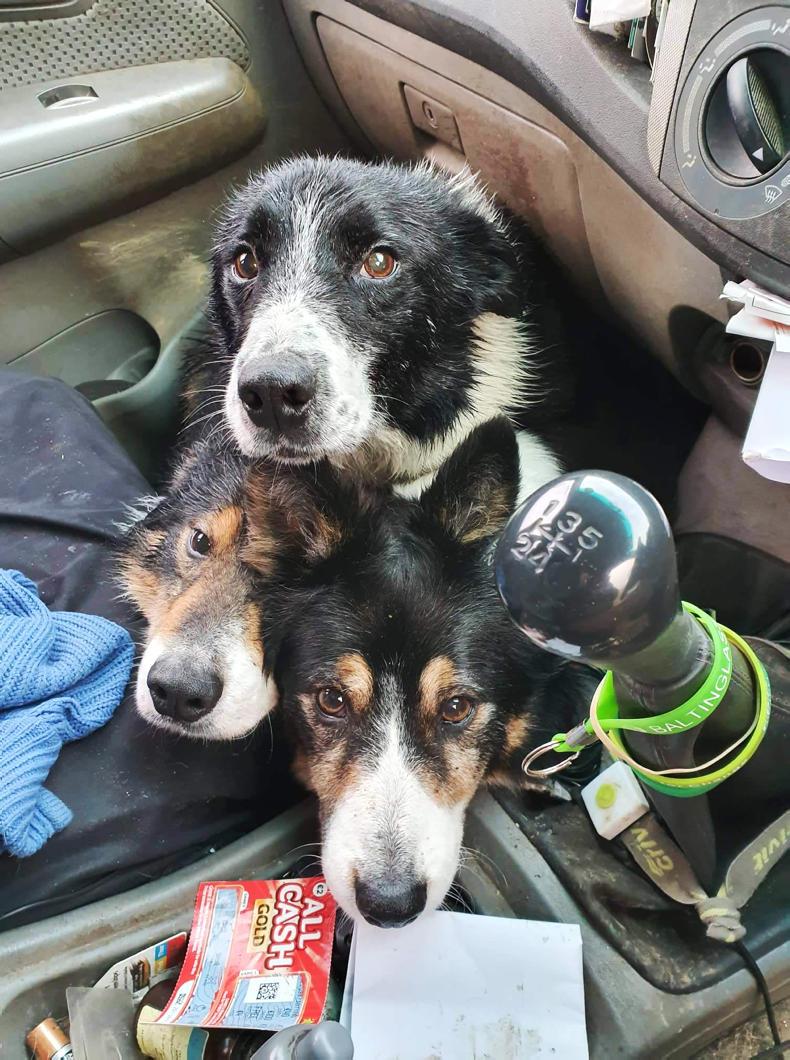
Donie Anderson's dogs are good companions as well as good workers. Pictured Jess and Toss (both tan) and Bob.
I did truck driving for a while but I was always farming as well. I was driving trucks because there was more money in it. Farming in the hills you have to be doing something else too because it’s not a big farm.
Sheepdogs
Now to supplement the farming, I do a bit of sheepdog training and demonstrations. My uncles always had good dogs for working. 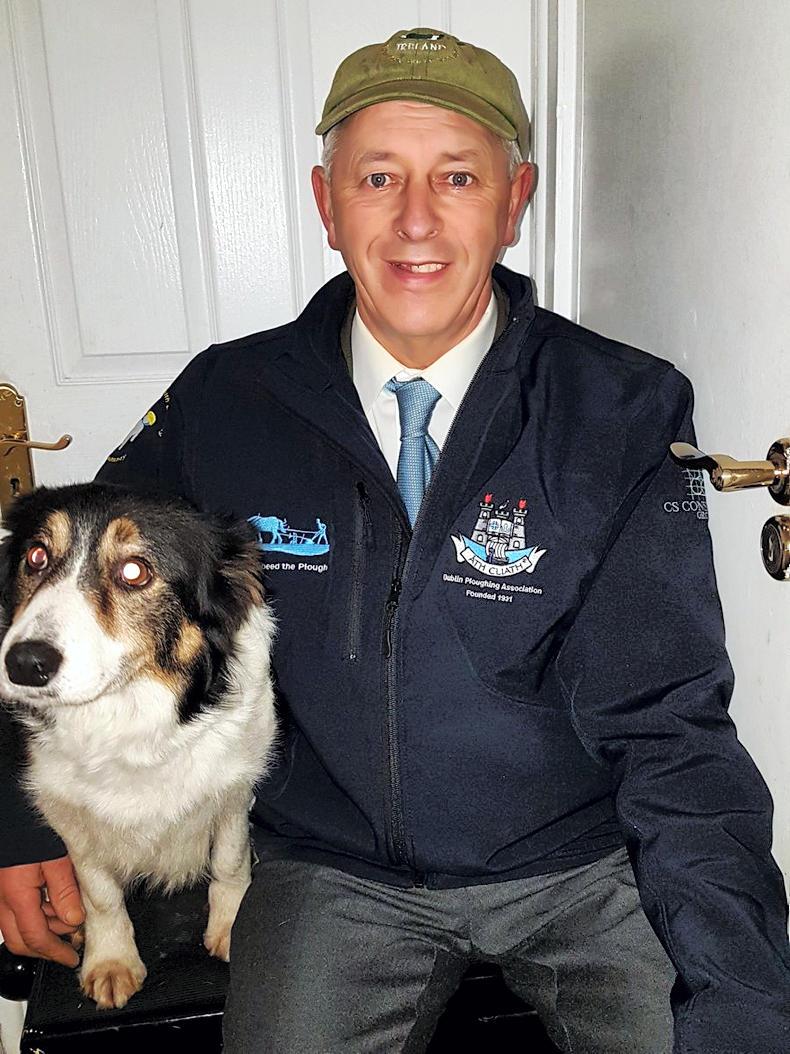
From the time when I was going to school I had a fairly good dog and most of the time I’ve had a good dog since. I went to my first sheepdog trials when I was less than 18 years old, not even driving yet.
I was always interested in trials. It was just something to be doing. You would be trying to make them better all the time. You make them better by competing with others to see the best one.
In the first one, I think I got second in the novice class. I didn’t do much better for a good while after.
I think I’ve trained about 30 dogs over the years. You get a good few years out of a dog, but every dog is different.
Most dogs can be trained, but not all. I think bitches are probably a bit easier, but I’m working with a couple of dogs at the minute and they’re alright.
Bitches tend to be more loyal. You have to treat dogs the same as people. Some of them you can and need to be tough with and some you can’t be tough on because they’d be too temperamental.
The one I have at the moment, I had her mother and her granny. They’d actually know what you’re saying and you don’t have to be too tough with them because they just understand you.
The dogs knows by the tone of your voice whether you’re being strict with them. They look at us as the leader of the pack so they want to please us. They have to have respect for us and we have to have respect for them.
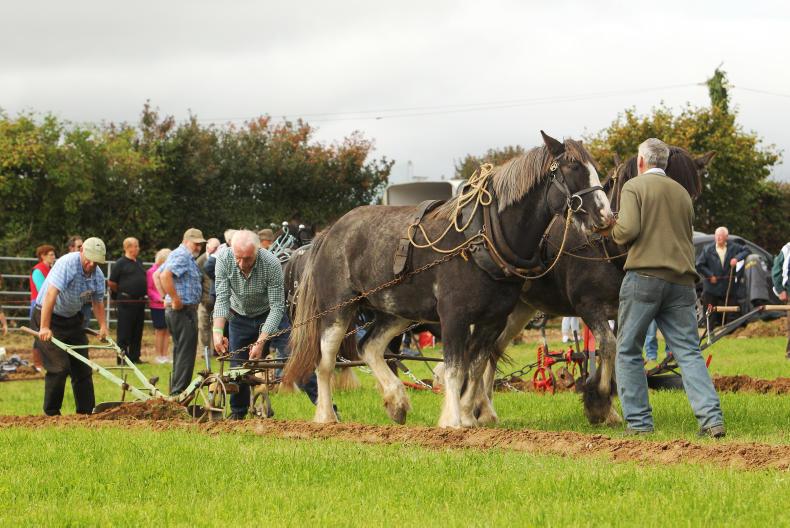
Donie Anderson, Mickey Niblock and Leslie Hanbidge competing in the Special Horse Class at the 2014 National Ploughing Championships at Ratheniska, Co Laois.
I get great satisfaction and pride when you train them and you know they can do something. If it’s just me and a dog, I’ll know whether we’ll be able to do something or not.
I won a couple of opens and I got placed in a good few, but I never went any further. Part of it was because I never had any time to do more.
Lots of people farm and compete but lots of people would also have somebody farming at home to help them out.
When I do the demonstrations, people who don’t know about it are fascinated to see how the dogs work. Some people say to me: “I used to have a great dog but now I have a quad.”
I say, you can’t go in and talk to your quad at night. The quad is great when you can use it, but we wouldn’t be able to use it on the hills.
Family
My daughter Mary is 11 years old and she’s talking about rearing a couple of pet lambs. I’ll encourage her to do so because she has the interest.
If some young people don’t take an interest what’s going to happen to farming, there has to be somebody doing it.
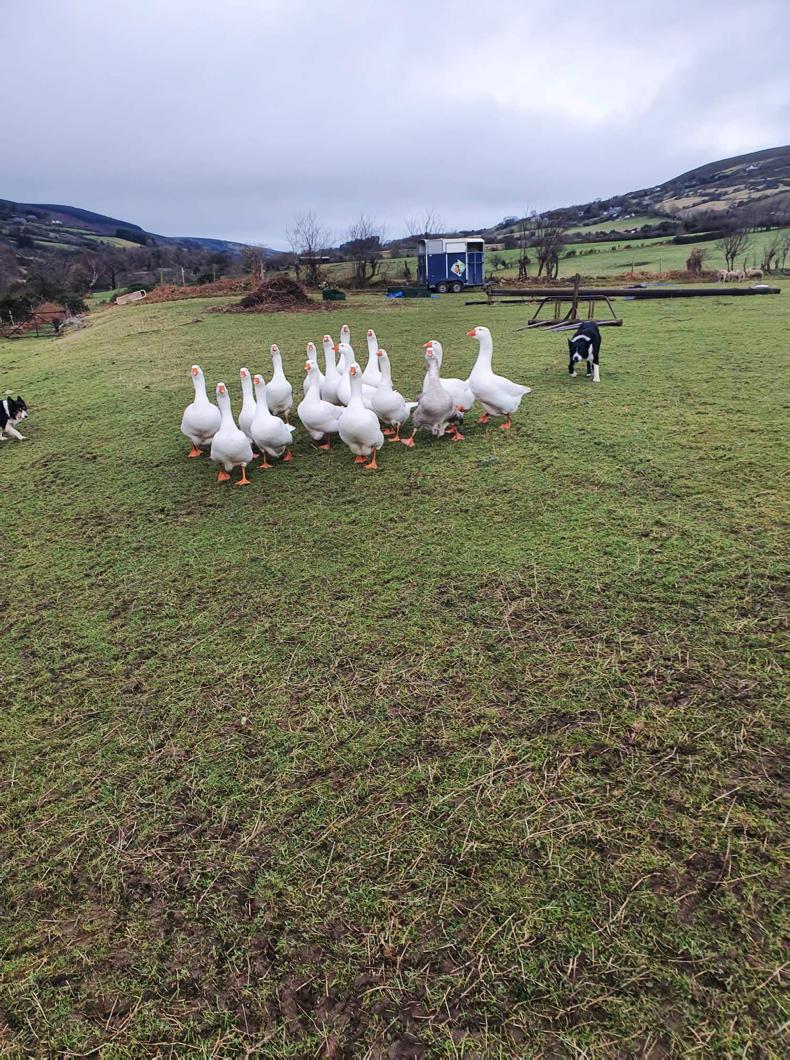
Donie Anderson's dogs working with geese.
There would be people who wouldn’t encourage their families to farm because there’s no money in it, but there was probably never that much money in it.
When Mary was starting school, we went into the school and there were records of some of the family going to that school since the 1700s.
Old practices
I would be interested in the older skills that are becoming less commonly practised. For example, I ploughed with horses in the National Ploughing Championships a couple of years back.
The only farmers that would remember ploughing that way would be older people, they won’t be able to do it again and they might not have transferred the skill to the younger generation. 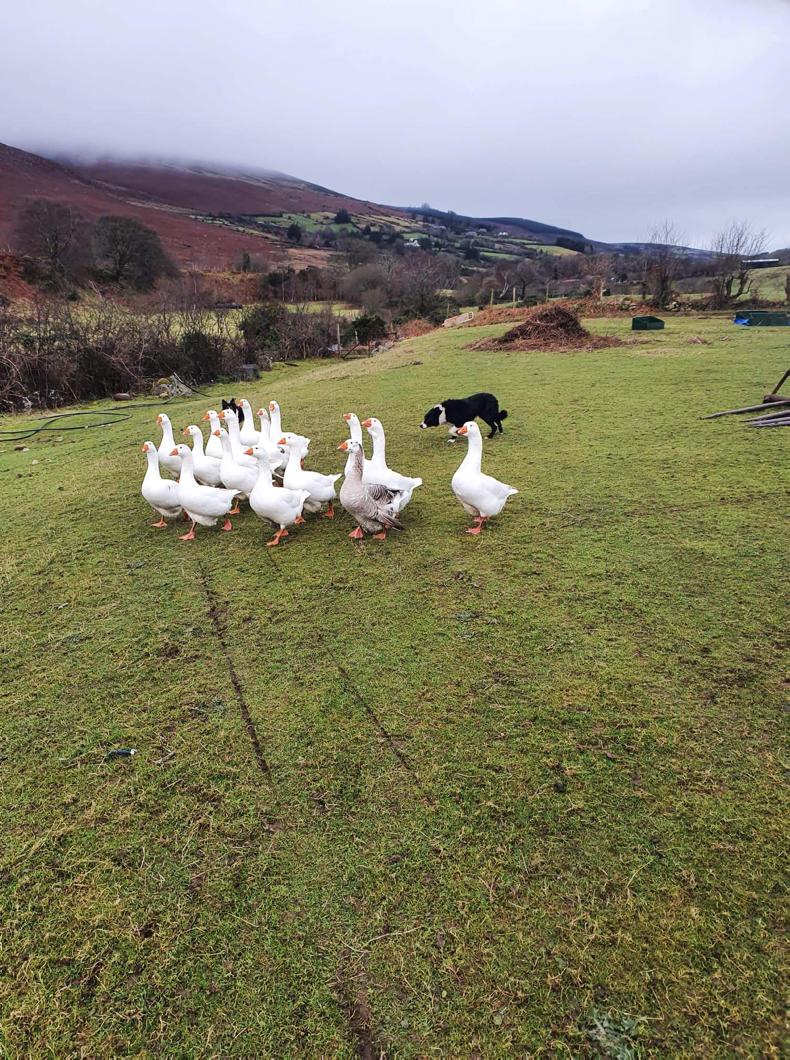
I just thought while I was able to do it, I’d do it. I also grew some oats at home and I ploughed the field with the horses, sowed the seed by hand and then we cut it and threshed it.
I would like to pass down to Mary an appreciation of the old traditions, how to work the dogs and to grow her own crops.
A few years ago I was able to grow whatever vegetables we needed for the year and I hope to do it again this year with her help. Little things like that which were handed down to me, I think it’s nice to pass them on.
Read more
'When I was a kid, I had to catch the blood from the pig for black pudding'
My Country Living: 'there was nearly a bonesetter in every county'
I was born and reared with farming. Where I’m living now is where I grew up in Castlekelly, Glenasmole, Tallaght. It’s up in the hills.
I have sheep on commonage with mostly Wicklow Cheviots, with some Lleyn and some Swaledale. The sheep are grazing in common with a few other flocks. Most of our sheep stay in their own little groups. I’d be minding them and running them up the hill every day. We’ll be lambing after 17 March.

Donie Anderson's dogs are good companions as well as good workers. Pictured Jess and Toss (both tan) and Bob.
I did truck driving for a while but I was always farming as well. I was driving trucks because there was more money in it. Farming in the hills you have to be doing something else too because it’s not a big farm.
Sheepdogs
Now to supplement the farming, I do a bit of sheepdog training and demonstrations. My uncles always had good dogs for working. 
From the time when I was going to school I had a fairly good dog and most of the time I’ve had a good dog since. I went to my first sheepdog trials when I was less than 18 years old, not even driving yet.
I was always interested in trials. It was just something to be doing. You would be trying to make them better all the time. You make them better by competing with others to see the best one.
In the first one, I think I got second in the novice class. I didn’t do much better for a good while after.
I think I’ve trained about 30 dogs over the years. You get a good few years out of a dog, but every dog is different.
Most dogs can be trained, but not all. I think bitches are probably a bit easier, but I’m working with a couple of dogs at the minute and they’re alright.
Bitches tend to be more loyal. You have to treat dogs the same as people. Some of them you can and need to be tough with and some you can’t be tough on because they’d be too temperamental.
The one I have at the moment, I had her mother and her granny. They’d actually know what you’re saying and you don’t have to be too tough with them because they just understand you.
The dogs knows by the tone of your voice whether you’re being strict with them. They look at us as the leader of the pack so they want to please us. They have to have respect for us and we have to have respect for them.

Donie Anderson, Mickey Niblock and Leslie Hanbidge competing in the Special Horse Class at the 2014 National Ploughing Championships at Ratheniska, Co Laois.
I get great satisfaction and pride when you train them and you know they can do something. If it’s just me and a dog, I’ll know whether we’ll be able to do something or not.
I won a couple of opens and I got placed in a good few, but I never went any further. Part of it was because I never had any time to do more.
Lots of people farm and compete but lots of people would also have somebody farming at home to help them out.
When I do the demonstrations, people who don’t know about it are fascinated to see how the dogs work. Some people say to me: “I used to have a great dog but now I have a quad.”
I say, you can’t go in and talk to your quad at night. The quad is great when you can use it, but we wouldn’t be able to use it on the hills.
Family
My daughter Mary is 11 years old and she’s talking about rearing a couple of pet lambs. I’ll encourage her to do so because she has the interest.
If some young people don’t take an interest what’s going to happen to farming, there has to be somebody doing it.

Donie Anderson's dogs working with geese.
There would be people who wouldn’t encourage their families to farm because there’s no money in it, but there was probably never that much money in it.
When Mary was starting school, we went into the school and there were records of some of the family going to that school since the 1700s.
Old practices
I would be interested in the older skills that are becoming less commonly practised. For example, I ploughed with horses in the National Ploughing Championships a couple of years back.
The only farmers that would remember ploughing that way would be older people, they won’t be able to do it again and they might not have transferred the skill to the younger generation. 
I just thought while I was able to do it, I’d do it. I also grew some oats at home and I ploughed the field with the horses, sowed the seed by hand and then we cut it and threshed it.
I would like to pass down to Mary an appreciation of the old traditions, how to work the dogs and to grow her own crops.
A few years ago I was able to grow whatever vegetables we needed for the year and I hope to do it again this year with her help. Little things like that which were handed down to me, I think it’s nice to pass them on.
Read more
'When I was a kid, I had to catch the blood from the pig for black pudding'
My Country Living: 'there was nearly a bonesetter in every county'






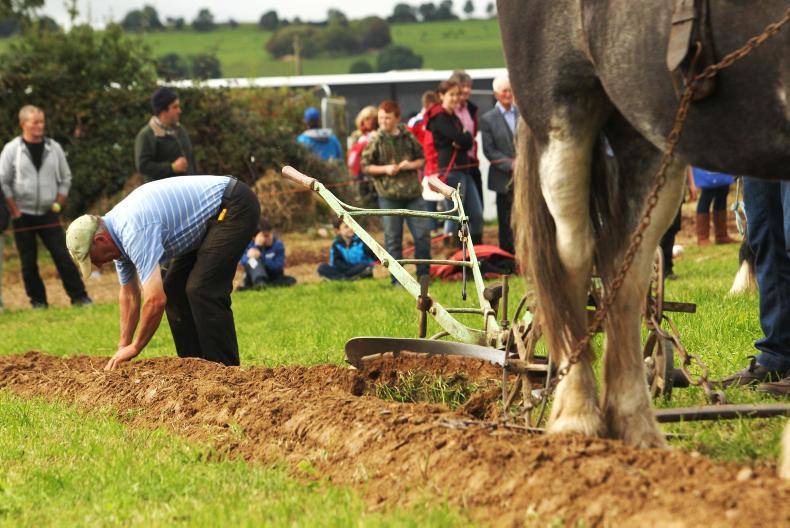




 This is a subscriber-only article
This is a subscriber-only article










SHARING OPTIONS: